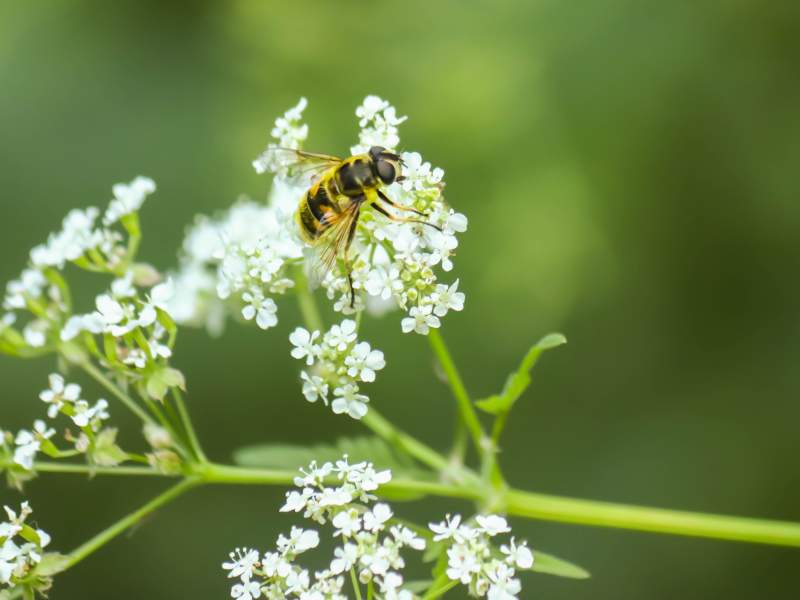You’d Bee Surprised Just How Much Pollinators Do for Us
From giving us the bright blooms of spring to helping us maintain our global food supplies, we’re buzzing about pollinators and what we can do to protect them.

May 20 is World Bee Day, and we’re celebrating with more than just buzz-worthy treats. We’re diving into the meaning behind the holiday and the important role pollinators play in maintaining the planet’s ecosystems and food systems.
You may be familiar with slogans like “Save the Bees” and “Protect the Pollinators.” But do you know the true extent of what pollinators do for us — and the many threats they face? This month, we’re taking the time to pause and appreciate our pollinators and acknowledge our role (as humans) in protecting these valuable species and their vulnerable ecosystems.
WHAT IS WORLD BEE DAY?
Created by the United Nations, World Bee Day is an opportunity to raise awareness about the importance of pollinators (bees, birds, bats, butterflies, and beyond), the many ways they impact our climate and global food supply, as well as the many threats they face today.
The truth is, pollinators play a crucial role in the survival of our ecosystems. Nearly 90% of wild flowering plants depend on animal pollination. Similarly, 75% of our global food crops and 35% of farmland depend on animal pollination, putting into perspective just how much our day-to-day lives depend on pollinators.
Without pollinators, countless species and processes within our ecosystems would collapse, impacting everything from biodiversity to global food supplies to biofuels and beyond. World Bee Day offers a chance to come together, generating momentum to strengthen protection for the bees and other pollinators we depend on.
SPOTLIGHT ON BEES
Why do bees often steal the pollinator spotlight? Well, it’s estimated that out of all pollinators, honeybees pollinate 80% of flowering plants, including over 130 food crops such as citrus fruits, watermelon, almonds, broccoli, and squash. Unlike other pollinators that are motivated by nectar, honeybees actively seek out pollen, so they can store it in their hive and use it as a source of nourishment to feed developing larvae. Honeybees are also easily manageable, so they can be (carefully) moved around to where they’re needed most.
INCREASED PRESSURE ON POLLINATORS
Over the last few decades, pollinators faced countless challenges. For bees in particular, extinction rates are 100-1,000 times higher than normal. Nearly 35% of invertebrate pollinators (such as bees and butterflies) around the globe face extinction, while 17% of vertebrate pollinators (such as bats and birds) do too.
What are some of the causes of this surge in extinction rates?
- Habitat and Biodiversity Loss: The wild habitats that sustain our pollinators are shrinking, making room for new roads, housing developments, non-native gardens, and more. The remaining wild spaces are few and far between, making it harder for pollinators to find new breeding sites and habitats.
- Chemical Pesticides: Conventional agriculture techniques, such as monocultures and the use of chemical pesticides reduce pollinators’ access to nourishment and nesting sites. They can also cause disease and weaken their immune systems.
- Climate Change: As temperatures continue to rise, spring is coming and going earlier than it should. This shift in the seasons has caused blooms to die early, pollinators to go hungry, and fewer plants to get pollinated.
- Invasive Species: Non-native plant species can overpower their native counterparts, resulting in habitat and food scarcity for pollinators. Non-native pollinators can also spread new viruses, fungi, and bacteria to native pollinators, increasing the frequency and intensity of disease.
Don’t worry, it’s not all bad news. The Save the Bees movement continues to advocate for the prioritization of bee research as well as healthier agricultural practices, encouraging the world to stay away from chemical pesticides and plant pollinator-friendly plants in our personal gardens and public lands.
The EPA has also recently launched its Pollinator Protection Initiative, funding pollinator site assessments to protect their vulnerable habitats.
CELEBRATING POLLINATORS AT 1 HOTELS
At 1 Hotel West Hollywood and 1 Hotel San Francisco, we’re proud to have on-site organic gardens and beehives that produce fresh, vibrant produce and honey. We sat down with the beekeeper at 1 Hotel San Francisco for a Q+A about his journey as a beekeeper, his methods in an urban setting, and how we can all do our part to support bees on a daily basis.
INTERVIEW WITH LARS ARCHER, A BEEKEEPER WITH BEST BEES, WHO MAINTAINS OUR HIVES AT 1 HOTEL SAN FRANCISCO
What called you to become a beekeeper? Were you always interested in bees?
My grandpa taught me how to beekeep when I was a kid; I always loved bees because I knew he had them. Part of what called me to beekeep professionally was to build upon the knowledge he gave me. I also wanted to earn some stripes and graduate out of being a hobbyist.
How do your methods at 1 Hotel San Francisco serve the greater bee population?
At Best Bees, our beehives aren’t just producing honey, they’re also producing data. Part of my beekeeping practices when tending to the bees is noting and recording that data in our proprietary hive health data library, Bzzz. That data is then analyzed by our in-house science team to fuel research into the health of bees and pollinators across the country, not just in San Francisco. The metrics captured from San Francisco hives provide unique insights that are compared to other regions to learn more about why bees thrive or struggle.
How does beekeeping in the city differ from other more rural areas? Do you have to tailor your methods? Do urban areas need more attention when it comes to nurturing bee populations?
For the most part, the beekeeping methods are the same. Our data actually shows that bees in urban areas do better than bees in rural areas! This makes beekeeping easier and also more fun, because we’re more likely to harvest honey from hives that are thriving. Beekeeping in the city comes with some very mundane challenges, compared to rural areas – for example, parking the vehicle you’re using to get from location to location is definitely harder in cities vs. rural areas!
What are some easy ways for people to support bee populations on a daily basis?
Plant some native or local flowers! Bees benefit from a diverse diet, just like humans. Providing them with more options to forage from is an easy and impactful way to support the bees. Another way to protect bee health is by cutting down on pesticides, herbicides, insecticides, etc. These chemicals are harmful to bees. Use natural and organic alternatives instead—like vinegar, essential oils, and integrated pest management methods.
Any fun facts about the bees at 1 Hotel San Francisco?
The 1 Hotel site experienced a nectar flow I’ve never seen before. The bees went into a frenzy of production, like they had really flipped a switch. That really demonstrates how dynamic, exciting and even mysterious urban ecosystems are. Where did they find all that forage?! It was wild.
BUZZ-WORTHY TREATS FOR WORLD BEE DAY
Did you know that by eating honey, you could be motivating bees to make a surplus supply? As long as the bees are active and given a healthy environment to thrive (as they are at our apiaries), harvesting honey does not harm the bees. We’re excited to celebrate World Bee Day at 1 Hotel West Hollywood with some of our favorite honey-infused creations, including the Bee’s Knee Cocktail and our house-made Honey Chocolate Truffles. Indulge guilt-free knowing our beekeepers are skilled at harvesting honey in a healthy way, leaving behind enough honey for the bees to nourish themselves too.












